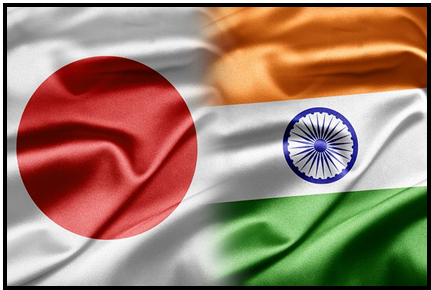INDIA-JAPAN RELATIONS
Syllabus:
- GS-2– Bilateral relations between India and Japan , Present significance for geostrategic and geopolitical importance
Focus :
- The article delves into the multifaceted relationship between India and Japan, highlighting its significance in regional security, economic cooperation, and cultural exchange. It also examines the key challenges that hinder the full potential of this strategic partnership and suggests ways to enhance collaboration in the face of evolving global dynamics.
Source-TH
Introduction
- Historical Ties: The relationship between India and Japan dates back to ancient times with cultural, religious, and economic exchanges. Buddhism played a significant role in the early interactions.
- Post-World War II Era: After World War II, India was one of the first countries to extend diplomatic relations with Japan, laying the foundation for a strong bilateral relationship.
Significance of India-Japan Relations
Strategic Partnership
- Quadrilateral Security Dialogue (Quad): India and Japan, along with the US and Australia, are part of the Quad, aimed at ensuring a free and open Indo-Pacific.
- Defense Cooperation: Regular joint military exercises like ‘Malabar’ enhance interoperability and strategic coordination between the two nations.
- Maritime Security: Both countries collaborate on maintaining maritime security in the Indo-Pacific region, crucial for global trade routes.
Economic and Trade Relations
- Trade Agreements: The Comprehensive Economic Partnership Agreement (CEPA) between India and Japan facilitates trade and investment.
- Japanese Investments: Japan is a major investor in India’s infrastructure projects, including the Delhi-Mumbai Industrial Corridor and high-speed rail projects.
- Technological Collaboration: Japan’s technological expertise complements India’s growth aspirations, especially in sectors like automotive, electronics, and renewable energy.
Cultural and Educational Exchange
- Cultural Programs: Exchange programs and cultural festivals help in strengthening people-to-people ties.
- Educational Initiatives: Scholarships and student exchange programs between Indian and Japanese universities promote academic collaboration and research.
Global and Regional Cooperation
- UN Reforms: Both countries support each other’s aspirations for permanent membership in the United Nations Security Council.
- Climate Change: Joint efforts in addressing climate change through sustainable development and clean energy initiatives.
- Humanitarian Aid and Disaster Relief: Collaborative efforts in providing humanitarian aid and disaster relief in times of crisis.
Challenges in India-Japan Relations
Economic Barriers
- Trade Imbalance: Despite robust trade relations, there is a significant trade imbalance, with Japan exporting more to India than importing.
- Non-Tariff Barriers: Regulatory and procedural barriers in both countries can hinder smooth trade flows.
Strategic and Security Concerns
- China’s Influence: The rise of China poses strategic challenges for both India and Japan. Balancing relations with China while enhancing bilateral ties can be complex.
- Regional Security Dynamics: The evolving security dynamics in the Indo-Pacific region require constant coordination and alignment of strategic interests.
Political and Diplomatic Hurdles
- Bureaucratic Red Tape: Administrative and bureaucratic delays can impede the implementation of bilateral projects and agreements.
- Changing Political Landscapes: Domestic political changes in either country can impact the continuity and stability of bilateral relations.
Socio-Cultural Challenges
- Cultural Differences: Despite strong cultural ties, differences in business practices, work culture, and societal norms can pose challenges.
- Language Barrier: Language remains a significant barrier in enhancing people-to-people connections and business collaborations.
Way Forward for India-Japan Relations
Strengthening Strategic Ties
- Enhanced Military Cooperation: Increasing the frequency and scope of joint military exercises and defense collaborations.
- Maritime Security Initiatives: Strengthening maritime security through joint patrolling, information sharing, and capacity building.
Boosting Economic Collaboration
- Trade Diversification: Expanding trade in diverse sectors such as healthcare, pharmaceuticals, and agriculture.
- Investment Facilitation: Simplifying investment procedures and reducing regulatory hurdles to attract more Japanese investments in India.
Deepening Cultural and Educational Ties
- Language and Cultural Training: Promoting language and cultural training programs to bridge cultural and communication gaps.
- Academic Collaborations: Encouraging joint research projects, faculty exchanges, and collaboration between universities and research institutions.
Enhancing Global and Regional Cooperation
- Multilateral Engagements: Collaborating in multilateral forums like the UN, G20, and ASEAN to address global challenges.
- Climate Action Partnerships: Strengthening partnerships in renewable energy, sustainable development, and climate change mitigation efforts.
Conclusion
- Mutual Benefits: The India-Japan relationship is built on mutual respect, shared values, and common interests, benefiting both countries.
- Future Prospects: With continued efforts to address challenges and leverage opportunities, India and Japan can further strengthen their strategic, economic, and cultural ties, contributing to regional and global stability and prosperity.
Associated Article
https://universalinstitutions.com/a-fab-way-to-conduct-india-japan-tech-diplomacy/
Mains UPSC Question
GS 2
Discuss the significance of India-Japan relations in the context of regional security, economic cooperation, and cultural exchange. What are the major challenges faced by this bilateral relationship, and suggest measures to strengthen the strategic partnership between the two nations in the evolving global order. (250 words)




